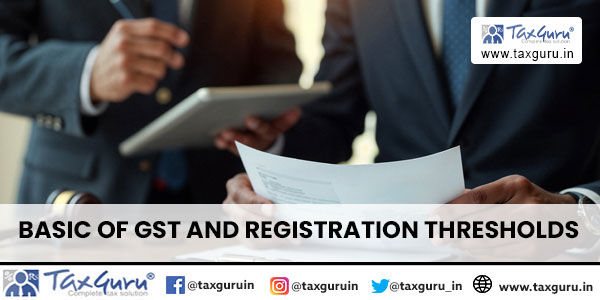Goods and Services Tax (GST) is an indirect tax in India levied on the supply of goods and services. It is a multi-stage, destination-based tax replacing earlier taxes like VAT, service tax, and excise duty. Businesses must register under GST if their turnover exceeds Rs. 40 lakhs (goods) or Rs. 20 lakhs (services) for normal states, and Rs. 20 lakhs (goods) or Rs. 10 lakhs (services) for special category states. From April 1, 2019, the threshold for goods was increased to Rs. 40 lakhs for some states. However, certain individuals, such as interstate suppliers, casual and non-resident taxable persons, and those under reverse charge mechanism, must register regardless of turnover. GST ensures tax is collected at every stage of supply, with the burden ultimately borne by the consumer.
What is GST?
GST means goods and service tax, is an indirect tax which is imposed by Government of India on the supply of goods and services. It is levy on every point of sale. It is a multi -stage, destination- oriented tax. It is a single tax on the supply of goods and services, right from the manufacturer to the consumer. It replaces various tax laws including VAT, service tax, excise etc.

For ex – Mr. A sell goods to Mr. B then GST will be charged by Mr. A on the bill and Mr. B have to pay it. Now, when Mr. B sells goods to Mr. C then Mr. B will charge GST on the bill and Mr. C have to pay it.
When we have to get registered our business under GST?
Businesses are required to get registered under GST, if the turnover of the business crosses the threshold limit which is Rs. 40 lakhs in case of goods and Rs. 20 lakhs in case of supply of services. Although business can voluntarily get registered under GST even the turnover is less than specified threshold limit.
From 1st April, 2019 there was change in the threshold limit for GST registration.
| Aggregate Turnover | Registration | Applicability | |
| Earlier limit for Goods / Services | |||
| Exceeds 20 lakh | Yes – For Normal Category States | Up to 31st March 2019 | |
| Exceeds 10 lakh | Yes – For Special Category States | Up to 31st March 2019 | |
| New Limit – For Sale of Goods | |||
| Exceeds Rs. 40 lakh | Yes – For Normal Category States | From 1st April 2019 | |
| Exceeds Rs. 20 lakh | Yes – For Special Category States | From 1st April 2019 | |
There was no change in the limit of supply of services. It is 20 lakh for normal states and 10 lakh for special category states.
Now the question is who are the special category states who opted for new limit.
| Normal Category States with a Threshold of Rs. 40 lakhs | Normal Category States that choose Status Quo | Special Category States with new GST threshold of Rs. 40 lakhs | Special Category States with new GST threshold of Rs. 20 lakhs |
|
|
|
|
There are certain categories of persons who are required to register under GST Act irrespective of the turnover limit.
1. Interstate supplies of goods
2. Casual taxable person
3. Non-resident taxable person
4. Person required to deduct TDS/TCS
5. Person taxable under reverse charge mechanism – It is applicable if you are the recipient of services.
6. E-commerce companies
7. Input service distributors
8. Individuals acting as agent or principal in a transaction on behalf of another person.





